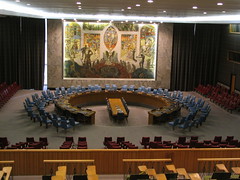Why Westminster will do anything to hold on to Scotland
Wings over Scotland recently published an interesting article which contained the following illuminating passage:
So why would the UK deliberately undermine the long-held view that the UK is a political union of different countries? The answer may be seen in a passage from the report stating that “Since the rUK (remainder of the UK) would be the same state as the UK, its EU membership would continue”, and that after independence, representatives of the UK Government would enter negotiations on the terms of independence “as representatives of the continuing state of the UK”.
From these two snippets it appears that the repositioning of the Act of Union as merely an enlargement of England is an attempt to retain sole-successor status in the same manner as Russia after the collapse of the Soviet Union. The Westminster government is so desperate to keep hold of the permanent Security Council seat that they’re willing to undermine the constitutional arrangements of the UK in order to ensure they keep it in the event of a Yes vote.
I’m not an expert on UN membership rules, but I would have thought there was a decent chance the rUK will retain the UK’s permanent seat on the Security Council. However, even a modest risk of losing that seat is probably enough to give the politicians and mandarins in the FCO and the rest of Westminster sleepless nights. Sacrificing the happiness and wellbeing of the Scots is a very small price to pay for maintaining a place amongst the great powers of the world.
Besides, the unionist politicians in Westminster are not the only ones who are worried. David Leask quotes Phillips O’Brien of Glasgow University for the following: “France’s place in the world would come under real pressure if Scotland were to leave the United Kingdom[.] In the first place, it could lead to reform of the UN Security Council and the concurrent loss or reduction of French influence in the UN.”
Personally I’m pretty relaxed about a reform of the Security Council, but I can understand that for a small group of politicians clinging to the remnants of the empire, it can seem like the end of the world as they know it, which explains why they attack Scottish independence so vociferously.

RT @arcofprosperity: New blog post: Why Westminster will do anything to hold on to Scotland http://t.co/zLzvkiEU #indyref
RT @arcofprosperity: New blog post: Why Westminster will do anything to hold on to Scotland http://t.co/zLzvkiEU #indyref
RT @arcofprosperity: New blog post: Why Westminster will do anything to hold on to Scotland http://t.co/zLzvkiEU #indyref
RT @arcofprosperity: New blog post: Why Westminster will do anything to hold on to Scotland http://t.co/zLzvkiEU #indyref
RT @arcofprosperity: New blog post: Why Westminster will do anything to hold on to Scotland http://t.co/zLzvkiEU #indyref
RT @arcofprosperity: New blog post: Why Westminster will do anything to hold on to Scotland http://t.co/zLzvkiEU #indyref
Det er måske forklaringen på at Cameron er så desperat efter at holde fast på en underskudsforretning.
http://jyllands-posten.dk/international/europa/article5198400.ece
If QE2 is still going to be monarch in Scotland then even after independence, it will still be the United Kingdom right? It’ll be a case of one kingdom, two sovereign parliaments like between 1606 and 1707 (excluding Cromwell’s years). The succession will remain the same right? Or will it be like in 1707 where a different succession was a very real possibility? Will the Union of the Crowns be dissolved too?
I don’t understand why a Yes result would result in the UK losing its seat on the permanent security council. Not that the UN is particularly effective at anything these days.
I guess part of the problem is that the UK’s constitution is pretty much unique. Elsewhere in the world, formerly sovereign states (e.g. Bavaria or Piedmont) have become provinces of the new nation state. There are probably more differences between some of the provinces of China than between Scotland and England. Maybe the problem is that the Union was too early: if it had happened in the 1870s, there was a repeatable pattern to follow and a proper federal structure would have been created. Scotland, England, Wales and Ireland would have become provinces of the UK rather than countries within a country. As it is, there’s the ‘country but not a country’ limbo where most English people and some Scots see “Britain” (all of it) as their country while other Scots don’t see England as being part of their country. E.g. I feel that Edinburgh is a British city but Phyl thinks of London as a foreign capital. All rather confusing.
Re the last paragraph: I don’t see it as clinging to the last remnants of Empire; more about clinging to the old Cold War global defence structures. The Council was a product of the Yalta negotiations. Britain, France, the U.S. and the USSR all had permanent seats because they were the victorious allies. The UN’s pronouncements are generally ignored these days: it’s not really respected by governments any more and it has an outdated and highly inefficient top-down model for international aid.